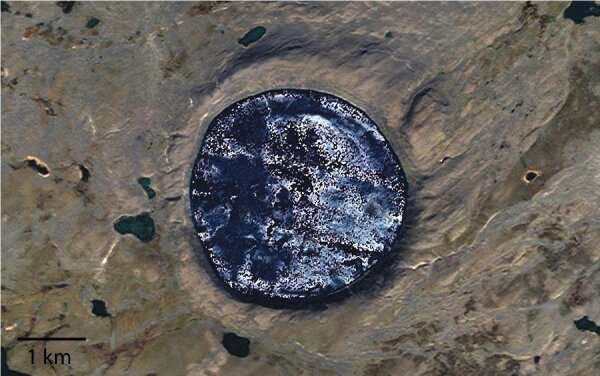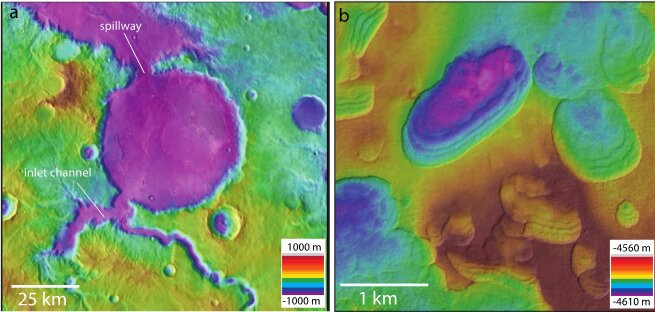Figure 1: An example of a large impact crater lake on Mars (a) and a small permafrost lake on Mars. Both images show elevation data from the MOLA (Mars Orbiter Laser Altimeter) and HRSC (High Resolution Stereo Camera) instruments draped over images from THEMIS (a) and CTX (b). Source: ESA/JPL/NASA/ASU/MSSS
Lakes are bodies of water fed by precipitation, snowmelt, rivers, and groundwater that make the earth teeming with life. Lakes also contain important geological records of past climates. Although Mars is now a frozen desert, scientists have shown that Mars contains evidence of ancient lakes that existed billions of years ago that may contain evidence of ancient life and climatic conditions on the red planet. Through a meta-analysis of years of satellite data showing evidence of lakes on Mars, Dr. Joseph MICHALSKI, a geologist in the Department of Earth Sciences at the University of Hong Kong (HKU), suggests that scientists may have dramatically underestimated the number of ancient mart lakes that once existed.
Michalski and the international team recently published their results in natural astronomy, which describe a global analysis of ancient Martian lakes. “We know of about 500 ancient lakes deposited on Mars, but almost all of the lakes we know of are larger than 100 km2‘ explains Michalski. “But on Earth, 70% of lakes are smaller than this size and occur in cold environments where glaciers have retreated. These small lakes are difficult to identify on Mars by satellite remote sensing, but there were likely many small lakes. It’s likely that at least 70% of Martian lakes have yet to be discovered.” Scientists are monitoring these small lakes on Earth to understand climate change. The missing small lakes on Mars could also hold important information about past climates.
The recent publication also reports that most of the known Martian lakes date to between 3,500 and 4,000 million years ago, but each of the lakes may have only lasted for a geologically short time (10,000 to 100,000 years) during this time span. This means that ancient Mars was likely also mostly cold and dry, but warmed episodically for short periods of time. Adds Michalski: “Because of the lower gravity on Mars and the ubiquitous, fine-grained soil, lakes on Mars would have been very turbid and might not have allowed light to penetrate very deeply, which could pose a challenge for photosynthetic life if it existed.” .”

Figure 2: Pingualuit Crater Lake in Canada is a modern example of a cold impact crater-hosted lake on Earth, analogous to ancient crater lakes on Mars. Photo credit: Google Earth
Lakes contain water, nutrients, and sources of energy for possible microbial life, including light for photosynthesis. Therefore, lakes are prime targets for astrobiological exploration by Mars rovers such as NASA’s Perseverance rover now on Mars. But Michalski warns, “Not all lakes are created equal hydrothermal systems that may have been conducive to the emergence of simple life.” From this perspective, it might make sense to target large, ancient lakes with different environmental conditions for future exploration.
“Earth hosts many environments that can serve as analogues to other planets. From the rugged landscape of Svalbard to the depths of Lake Mono, right here at home we can shape how we develop tools to discover life elsewhere. Most of these tools are aimed at detecting the remnants and residues of microbial life,” said Dr. David BAKER, an ecologist at the HKU School of Biological Sciences who is well informed about Earth’s microbial systems in lakes.
China successfully landed its first lander, Zhurong, on Mars in May this year. Zhurong is currently roaming the plains of Utopia Planitia, researching mineralogical and chemical evidence of recent climate change. China is also planning a trial repatriation mission, expected to take place later this decade, that could target one of the lake deposits of interest.
The world’s lakes emit less methane than previously thought
Joseph R. Michalski et al, Geological Diversity and Microbiological Potential of Lakes on Mars, natural astronomy (2022). DOI: 10.1038/s41550-022-01743-7
Provided by the University of Hong Kong
Citation: The number of ancient martian lakes may have been dramatically underestimated by scientists (2022 September 16) retrieved September 17, 2022 from https://phys.org/news/2022-09-ancient-martian-lakes-underestimated- scientists.html
This document is protected by copyright. Except for fair trade for the purpose of private study or research, no part may be reproduced without written permission. The content is for informational purposes only.
#number #ancient #Martian #lakes #dramatically #underestimated #scientists


Leave a Comment